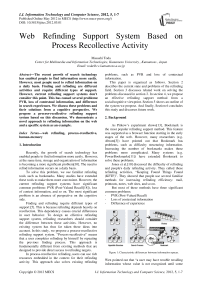Web Refinding Support System Based on Process Recollective Activity
Автор: Masashi Toda
Журнал: International Journal of Information Technology and Computer Science(IJITCS) @ijitcs
Статья в выпуске: 5 Vol. 4, 2012 года.
Бесплатный доступ
The recent growth of search technology has enabled people to find information more easily. However, most people need to refind information on a daily basis. Finding and refinding are different activities and require different types of support. However, current refinding support systems don't consider this point. This has caused several problems: PVR, loss of contextual information, and difference in search experiences. We discuss these problems and their solutions from a cognitive perspective. We propose a process-recollective refinding support system based on this discussion. We demonstrate a novel approach to refinding information on the web and a specific system as an example.
Web refinding, process-recollective, human-memory
Короткий адрес: https://sciup.org/15011683
IDR: 15011683
Список литературы Web Refinding Support System Based on Process Recollective Activity
- Del.icio.us, http://del.icio.us/
- Digg, http://digg.com/
- D. Abrams, R. Baecker, and M. Chignell. Information archiving with bookmarks: personalWeb space construction and organization. Proceedings of the SIGCHI conference on Human factors in computing systems, pages 41-48, 1998.
- E. Ayers and J. Stasko. Using Graphic History in Browsing the World Wide Web. Graphics, Visualization & Usability Center, Georgia Institute of Technology, 1995.
- R. Capra, M. Pinney, and M. P´erez-Qui˜nones. Refinding Is Not Finding Again. Technical report, Technical Report TR-05-10, Computer Science, Virginia Tech, 2005.
- R. Capra III and M. P´erez-Qui˜nones. Mobile refinding of web information using a voice interface: an exploratory study. Proceedings of the 2005 Latin American conference on Human-computer interaction, pages 88-99, 2005.
- A. Cockburn and S. Jones. Which way now? Analysing and easing inadequacies inWWWnavigation. International Journal of Human Computer Studies, 45(1):105-129, 1996.
- E. Freeman and D. Gelernter. Lifestreams: a storage model for personal data. ACM SIGMOD Record, 25(1):80-86, 1996.
- R. Herz. The effects of cue distinctiveness on odorbased context-dependent memory. Memory & Cognition, 25(3):375-80, 1997
- W. Jones, H. Bruce, and S. Dumais. Keeping found things found on the web. Proceedings of the tenth international conference on Information and knowledge management, pages 119-126, 2001.
- W. Li, Y. Hara, R. Ito, Y. Kimura, K. Shimazu, Y. Saito, Q. Vu, E. Chang, D. Agrawal, K. Hirata, et al. PowerBookmarks: a system for personalizableWeb information organization, sharing, and management. Proceedings of the 1999 ACM SIGMOD international conference on Management of data, pages 565-567, 1999.
- D. Nelson, V. Reed, and J. Walling. Pictorial superiority effect. J Exp Psychol [Hum Learn, 2(5):523-8, 1976.
- J. Pitkow and C. Kehoe. Emerging trends in theWWWuser population. Communications of the ACM, 39(6):106-108, 1996.
- B. Rhodes. The wearable remembrance agent: A system for augmented memory. Personal Technologies, 1(4):218-224, 1997.
- J. Surowiecki. The wisdom of crowds: why the many are smarter than the few and how collective wisdom shapes business, economies, societies, and nations. Doubleday, 2004.
- J. Teevan, C. Alvarado, M. Ackerman, and D. Karger. The perfect search engine is not enough: a study of orienteering behavior in directed search. Proceedings of the 2004 conference on Human factors in computing systems, pages 415-422, 2004.
- E. Tulving and D. Thomson. Encoding Specificity and Retrieval Processes in Episodic Memory. Psychological Review, 80(5):352-73, 1973.
- J. Wen. Post-Valued Recall Web Pages: User Disorientation Hits the Big Time. IT & Society, 1(3):184-194, 2003.


